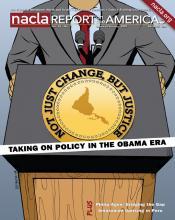
What Latin America needs is not change that would enhance U.S. interests, but a healthy dose of social justice. The region suffers from astounding inequality. In Bolivia, according to the UN Development Program (UNDP), the ratio of income received by the richest 10% of the population to the poorest 10% is 168 to one, making it the most income-unequal country in the world. Ten Latin American countries are among the next 15 on the UNDP’s rankings, vying for second place among the “most unequal.” Inequality between countries is also immense. According to LatinFocus, about 70% of the region’s GDP is produced by just two countries, Brazil and Mexico. And IMF figures show that GDP per capita in Chile, Argentina, Uruguay, and Venezuela is more than double that of most of the countries of Central America and the Caribbean.
Any policy agenda for the Americas — one that promotes economic development, inclusive social policies, equal access to resources and infrastructure, and genuine democratic participation—must begin with these hard facts. And it must take into account that all this exists under the careful watch of the United States, whose influence in the region, the Brookings report laments, is slipping away. The long-standing U.S. pursuit of its own interests across the region must be held at least partially responsible for this sorry state of affairs.
